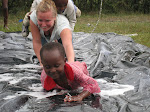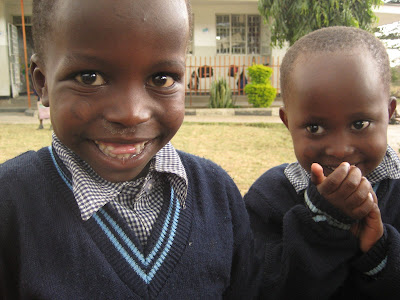The least we could do to say thanks to our benefactors was procure one measly letter.
 Stefano's random scribblings of Crayon (just because you put an incoherent sequence of letters doesn't make it a real "letter" but they're definitely trying.)
Stefano's random scribblings of Crayon (just because you put an incoherent sequence of letters doesn't make it a real "letter" but they're definitely trying.)To collect them, we were going to have to go to each kid's individual home/foster home and pick them up personally. Our "last day of work," already extended indefinitely from its original date of December 3, was ♫ beginning to look a lot like Christmas... ♫
But that is just life in Tanzania, isn't it? Nothing, ever, goes the way you want it to go, and you have to embrace that difference if you want to keep your akili. The key, especially for a rookie NGO like TFFT, is to have fun with it and realize that we are not in control, no matter how hard it is to admit.
Hunter and I were lucky to find a handful of kids, mostly the crew from the Nkoaranga orphanage that we picked out with the help of Mama Mike, still in the dorm when we showed up. We rolled in expecting to find the place packed with kids excited to go home after a long semester; we rolled out feeling fortunate to have gotten a third of our new task out of the way in one stop.

There is a lot of BS thrown our way in this job. The healthy servings of dishonesty, the omnipresent hustling, mountains of seemingly unavoidable controversy, making me wonder what it is exactly that the two of us are doing here. "Fikiria Kwanza" literally means "Think First" in Swahili, after all, and that's the one thing I didn't do before signing on a year of my life to teach there. Ironic, I know -- my father warned me repeatedly to do just one thing before agreeing to anything so time-consuming: "You need to think first, son." Hunter is essentially in the same boat; within an hour of meeting our boss for the first time, he was in. Does it come as any surprise, then, that both of us have had more than our fair share of crisis moments regarding whether or not our presence here is a good thing?
Are we even really helping in the end?
The answer depends on your expectations.
To claim that TFFT is going to "transform education in the Developing World" seems like fighting windmills. Not going to happen. But to claim that we are going to provide opportunities in life for kids like Neema, Roichi, Daniel, Helana, Lomnyak and Amani, not to mention the dozens of others TFFT has already placed in school in this, our first year of existence, is like Steve Nash lining up at the free throw line. Ninety percent chance of success.
Are we even really helping the end? Yes. It's a drop in the bucket, but yes.
Every drop is a living, breathing human being, though. That is what drives me in my work here in Tanzania.
Neither Hunter nor I get paid, but when it comes to seeing smiles on our kids' faces, we will gladly work two weeks' overtime. Neither of us work for the glory of TFFT; we work to provide a brighter future for just a few living, breathing drops in the bucket.
Times like the one above sure don't feel like work. The trek up and down the gargantuan hill in Nkoaranga; our rented car getting stuck in the mud for 30 minutes in the maze of obscure villages behind it; kids not being where they're supposed to be when they're supposed to be there -- that feels like work.
But Neema's smiling face?

That is worth more to me than all the paychecks I am missing out on at home.
Neema's sponsor back in the States will soon be receiving a random scribbling of Crayon and a progress report in the mail. That is the best we can do in our attempt to say thanks on Neema's behalf. But maybe a glimpse of her smile is just a little bit better.
We're all just drops in the bucket. That's what I tell myself whenever I feel overwhelmed by the sensation that Hunter and I are fighting windmills alone in a part of the world I never dreamed I'd live in. Every single one of us is a drop. Living, breathing, human drops.























